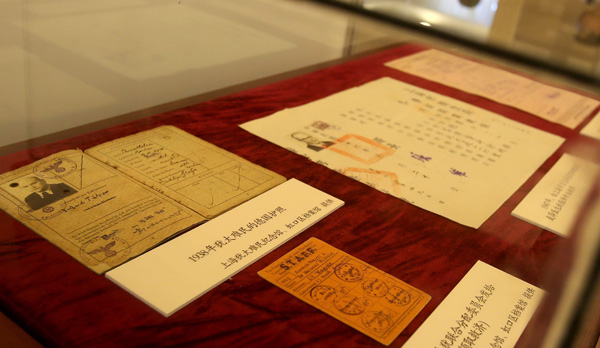 |
|
Items documenting the Jewish experience in Shanghai during the 1930s and 1940s are exhibited on Tuesday. [Photo/ Xinhua] |
The museum said it will continue enriching and improving its collection of historical materials and make them part of the national legacy archives, and then global archives.
It revealed the plan at the third Jewish Studies Youth Forum on Tuesday.
At least 20,000 Jewish people sought shelter in Shanghai during the war, or used the city as a jumping-off point for other safe destinations.
Documents related to Jewish refugees' lives in Shanghai during the 1930s and 1940s were listed in the municipality's legacy archives last year.
The museum has registered 549 items documenting the Jewish experience so far, including tickets for the voyage from Europe to Shanghai, certificates for job applications and audio and video recordings of interviews with former refugees.
The materials capture the chain of life of Jewish refugees, but they are insufficient to qualify for the national archives, said Liao Guangjun, a senior adviser for the museum.
"We hope to work with the municipal archives and other institutions to access more official documents. We also hope to collect more materials from the surviving refugees, who are passing away because of old age. We are running out of time," Liao said.
Hongkou district was Shanghai's Jewish quarter in the 1940s, when a large number of Jewish refugees poured from Europe into the open harbor of Shanghai, which didn't require a visa for entrance.
The city had a Jewish community as early as the late 19th century whose members started businesses, created architecture and resumed a normal living environment, with cafeterias, clubs, photography studios and many other elements. Shanghai was known as the "Noah's Ark of the East" for refugees.
"We have received donations not only from former refugees and their families but also from Shanghai residents who lived next door to Jewish neighbors," said Zhou Xiaoxia, deputy director of the museum.
The museum has received a collection of books in Hebrew and other foreign languages that were left behind in a local household, as well as antique furniture pieces and a vintage sewing machine.
"The donors often have touching stories to share - of the friendships between Chinese and Jewish families and the mutual help in hard times." It's a pity though, insufficient documents have survived the historical turbulence through the past decades, she said.
